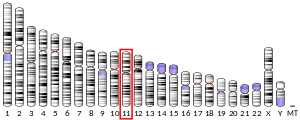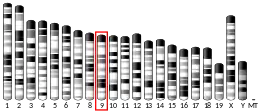Piwi like RNA-mediated gene silencing 4 is a protein that in humans is encoded by the PIWIL4 gene. [5]
Function
PIWIL4 belongs to the Argonaute family of proteins, which function in development and maintenance of germline stem cells (Sasaki et al., 2003 [PubMed 12906857]).
References
- 1 2 3 GRCh38: Ensembl release 89: ENSG00000134627 - Ensembl, May 2017
- 1 2 3 GRCm38: Ensembl release 89: ENSMUSG00000036912 - Ensembl, May 2017
- ↑ "Human PubMed Reference:". National Center for Biotechnology Information, U.S. National Library of Medicine.
- ↑ "Mouse PubMed Reference:". National Center for Biotechnology Information, U.S. National Library of Medicine.
- ↑ "Entrez Gene: Piwi like RNA-mediated gene silencing 4". Retrieved 2017-02-11.
Further reading
- Sugimoto K, Kage H, Aki N, Sano A, Kitagawa H, Nagase T, Yatomi Y, Ohishi N, Takai D (2007). "The induction of H3K9 methylation by PIWIL4 at the p16Ink4a locus". Biochem. Biophys. Res. Commun. 359 (3): 497–502. doi:10.1016/j.bbrc.2007.05.136. PMID 17544373.
- Li L, Yu C, Gao H, Li Y (2010). "Argonaute proteins: potential biomarkers for human colon cancer". BMC Cancer. 10: 38. doi:10.1186/1471-2407-10-38. PMC 2843668. PMID 20146808.
- Rose JE, Behm FM, Drgon T, Johnson C, Uhl GR (2010). "Personalized smoking cessation: interactions between nicotine dose, dependence and quit-success genotype score". Mol. Med. 16 (7–8): 247–53. doi:10.2119/molmed.2009.00159. PMC 2896464. PMID 20379614.
- Kim JS, Choi YY, Jin G, Kang HG, Choi JE, Jeon HS, Lee WK, Kim DS, Kim CH, Kim YJ, Son JW, Jung TH, Park JY (2010). "Association of a common AGO1 variant with lung cancer risk: a two-stage case-control study". Mol. Carcinog. 49 (10): 913–21. doi:10.1002/mc.20672. PMID 20721975. S2CID 206233924.
- Gu A, Ji G, Shi X, Long Y, Xia Y, Song L, Wang S, Wang X (2010). "Genetic variants in Piwi-interacting RNA pathway genes confer susceptibility to spermatogenic failure in a Chinese population". Hum. Reprod. 25 (12): 2955–61. doi:10.1093/humrep/deq274. PMID 20940137.
- Gu A, Ji G, Shi X, Long Y, Xia Y, Song L, Wang S, Wang X (2010). "Genetic variants in Piwi-interacting RNA pathway genes confer susceptibility to spermatogenic failure in a Chinese population". Hum. Reprod. 25 (12): 2955–61. doi:10.1093/humrep/deq274. PMID 20940137.
- Su C, Ren ZJ, Wang F, Liu M, Li X, Tang H (2012). "PIWIL4 regulates cervical cancer cell line growth and is involved in down-regulating the expression of p14ARF and p53". FEBS Lett. 586 (9): 1356–62. doi:10.1016/j.febslet.2012.03.053. PMID 22483988. S2CID 45962616.
- Greither T, Koser F, Kappler M, Bache M, Lautenschläger C, Göbel S, Holzhausen HJ, Wach S, Würl P, Taubert H (2012). "Expression of human Piwi-like genes is associated with prognosis for soft tissue sarcoma patients". BMC Cancer. 12: 272. doi:10.1186/1471-2407-12-272. PMC 3472179. PMID 22748119.
- Bao J, Zhang Y, Schuster AS, Ortogero N, Nilsson EE, Skinner MK, Yan W (2014). "Conditional inactivation of Miwi2 reveals that MIWI2 is only essential for prospermatogonial development in mice". Cell Death Differ. 21 (5): 783–96. doi:10.1038/cdd.2014.5. PMC 3978311. PMID 24464225.
This article incorporates text from the United States National Library of Medicine, which is in the public domain.
This article is issued from Wikipedia. The text is licensed under Creative Commons - Attribution - Sharealike. Additional terms may apply for the media files.



